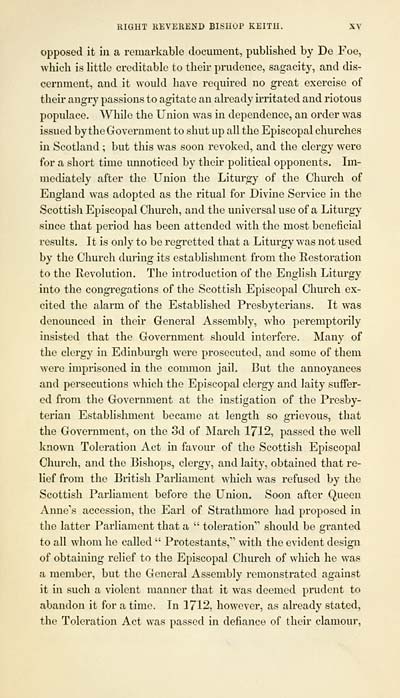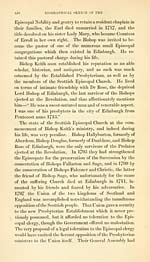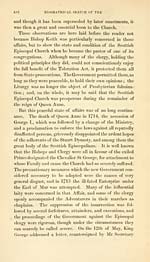Spottiswoode Society > History of the affairs of the Church and State of Scotland from the beginning of the reformation to the year 1568 > Volume 1
(23) Page xv
Download files
Complete book:
Individual page:
Thumbnail gallery: Grid view | List view

RIGHT REVEREND BISHOP KEITH. XV
opposed it ill a remarkable document, published by De Foe,
which is little creditable to their prudence, sagacity, and dis-
cernment, and it would have required no great exercise of
their angry passions to agitate an already irritated and riotous
populace. While the Union was in dependence, an order was
issued by the Government to shut up all the Episcopal churches
in Scotland ; but this was soon revoked, and the clergy were
for a short time unnoticed by their political opponents. Im-
mediately after the Union the Liturgy of the Church of
England was adopted as the ritual for Divine Service in the
Scottish Episcopal Church, and the universal use of a Liturgy
since that period has been attended with the most beneficial
results. It is only to be regretted that a Liturgy was not used
by the Church during its establishment from the Eestoration
to the Revolution. The introduction of the English Liturgy
into the congregations of the Scottish Episcopal Church ex-
cited the alarm of the Established Presbyterians. It was
denounced in their General Assembly, who peremptorily
insisted that the Government should interfere. Many of
the clergy in Edinburgh were prosecuted, and some of them
were imprisoned in the common jail. But the annoyances
and persecutions which the Episcopal clergy and laity suffer-
ed from the Government at the instigation of the Presby-
terian Establishment became at length so grievous, that
the Government, on the 3d of March 1712, passed the well
known Toleration Act in favour of the Scottish Episcopal
Church, and the Bishops, clergy, and laity, obtained that re-
lief from the British Parliament which was refused by the
Scottish Parliament before the Union. Soon after Queen
Anne's accession, the Earl of Strathmore had proposed in
the latter Parliament that a " toleration" should be granted
to all whom he called " Protestants, 11 with the evident design
of obtaining relief to the Episcopal Church of which he was
a member, but the General Assembly remonstrated against
it in such a violent manner that it was deemed prudent to
abandon it for a time. In 1712, however, as already stated,
the Toleration Act was passed in defiance of their clamour,
opposed it ill a remarkable document, published by De Foe,
which is little creditable to their prudence, sagacity, and dis-
cernment, and it would have required no great exercise of
their angry passions to agitate an already irritated and riotous
populace. While the Union was in dependence, an order was
issued by the Government to shut up all the Episcopal churches
in Scotland ; but this was soon revoked, and the clergy were
for a short time unnoticed by their political opponents. Im-
mediately after the Union the Liturgy of the Church of
England was adopted as the ritual for Divine Service in the
Scottish Episcopal Church, and the universal use of a Liturgy
since that period has been attended with the most beneficial
results. It is only to be regretted that a Liturgy was not used
by the Church during its establishment from the Eestoration
to the Revolution. The introduction of the English Liturgy
into the congregations of the Scottish Episcopal Church ex-
cited the alarm of the Established Presbyterians. It was
denounced in their General Assembly, who peremptorily
insisted that the Government should interfere. Many of
the clergy in Edinburgh were prosecuted, and some of them
were imprisoned in the common jail. But the annoyances
and persecutions which the Episcopal clergy and laity suffer-
ed from the Government at the instigation of the Presby-
terian Establishment became at length so grievous, that
the Government, on the 3d of March 1712, passed the well
known Toleration Act in favour of the Scottish Episcopal
Church, and the Bishops, clergy, and laity, obtained that re-
lief from the British Parliament which was refused by the
Scottish Parliament before the Union. Soon after Queen
Anne's accession, the Earl of Strathmore had proposed in
the latter Parliament that a " toleration" should be granted
to all whom he called " Protestants, 11 with the evident design
of obtaining relief to the Episcopal Church of which he was
a member, but the General Assembly remonstrated against
it in such a violent manner that it was deemed prudent to
abandon it for a time. In 1712, however, as already stated,
the Toleration Act was passed in defiance of their clamour,
Set display mode to: Large image | Transcription
Images and transcriptions on this page, including medium image downloads, may be used under the Creative Commons Attribution 4.0 International Licence unless otherwise stated. ![]()
| Permanent URL | https://digital.nls.uk/79597064 |
|---|
| Description | Volume I. |
|---|---|
| Attribution and copyright: |
|

